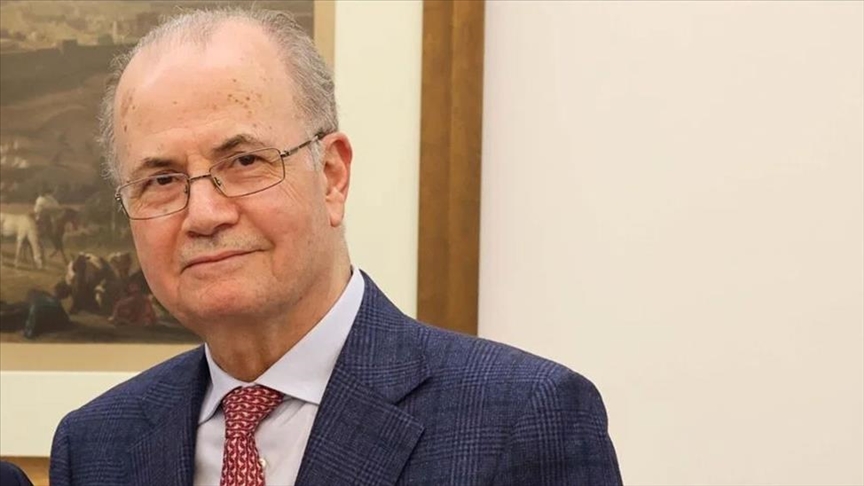19th Palestine government led by Mohammad Mustafa: Majority technocrats
New government has 23 ministers, including Fatah movement’s Ziad Hab al-Reeh

RAMALLAH, Palestine
Mohammad Mustafa, appointed prime minister of the Palestinian Authority (PA) formed a new government, mostly composed of new technocrats.
Names that dominated the political arena in the West Bank for years are now absent from the lineup except for Interior Minister Ziad Hab al-Reeh, who is affiliated with the Fatah movement.
“Prime Minister-designate Mohammad Mustafa has presented his government's action plan and proposed formation list to President Mahmoud Abbas for confidence under the Basic Law for its approval,” the official Palestinian news agency, WAFA, reported Thursday.
Abbas issued “a decree granting confidence to the 19th Palestinian government and issued a decree regarding its formation,” it added.
The new government is scheduled to be sworn in March 31.
Technocrats government
The new government includes 23 ministers, a downsizing from 26 ministers in the previous government.
One of the new government’s most important features is its largely non-partisan nature, as its composition is dominated by technocratic ministers, except al-Reeh.
Al-Reeh retained the Interior Ministry portfolio he held in the previous government headed and formed by Mohammad Shtayyeh in March 2019.
Al-Reeh previously held the position of head of the Preventive Security Service, a security agency affiliated with the Palestinian President’s office.
As for the head of the new government, Mustafa is not a member of Fatah, however, he is a senior economic advisor to Abbas and a member of the Palestine Liberation Organization's Executive Committee.
Mustafa has held several positions in previous governments, in addition to the chairmanship of the Palestine Investment Fund (PIF), one of the institutions of the Palestine Liberation Organization since 2015.
In this government, Mustafa retained the position of Foreign Minister, in addition to its presidency.
Absence of old names
The 19th Palestinian government sees a notable turnover in ministerial positions, with the exception of al-Reeh. Absent from the roster are prominent figures who have long dominated the political landscape in the West Bank.
Among notable absentees is Foreign Minister Riyad al-Maliki, who has been a fixture in that position since 2009 but was notably excluded from the new lineup.
Finance Minister Shukri Bishara who has held the position since 2013, was also excluded.
In terms of restructuring ministries, the new government opted to merge the education and higher education portfolios into a singular entity named the Ministry of Education and Higher Education.
Meanwhile, the Ministry of Entrepreneurship portfolio, established in the previous administration to spearhead entrepreneurial endeavors, has been abolished in restructuring.
The new lineup notably omitted a portfolio for the Ministry of Information. It remains uncertain whether a dedicated minister will be appointed to oversee its functions or if its responsibilities will be integrated into another portfolio.
Minister of State for Relief
In a significant development, the appointment of a Minister of State for the Ministry of Foreign Affairs and Expatriates marks a first in the governmental structure.
Additionally, a new position, the Minister of State for Relief Affairs, has been established, likely in response to the dire circumstances prevailing in the Gaza Strip amid the ongoing Israeli war.
The establishment of an Industry Ministry is a notable addition to the structure.
Furthermore, a rebranding effort saw the renaming of the Ministry of Communications and Information Technology to the Ministry of Communications and Digital Economy, reflecting a contemporary focus on digital advancements and economic strategies.
Representation of women within the ministry remained consistent with that of the previous Shtayyeh government, comprising three female ministers overseeing portfolios related to labor, women's affairs and the Ministry of State for Foreign and Expatriates Affairs.
The new government included eight ministers from the Gaza Strip.
The following is the full lineup, as reported by Wafa.
1. Mohammad Mustafa - Prime Minister/Minister of Foreign Affairs and Expatriates
2. Shurahbil Al-Zaeem - Minister of Justice
3. Ziad Hab Al-Reeh - Minister of Interior
4. Omar Al-Bittar - Minister of Finance
5. Wael Zaqqout - Minister of Planning and International Cooperation
6. Sami Hajjawi - Minister of Local Government
7. Majid Abu Ramadan - Minister of Health
8. Amjad Barham - Minister of Education and Higher Education
9. Enas Dahadha - Minister of Labor
10. Mohammad Mustafa Najem - Minister of Awqaf and Religious Affairs
11. Arafat Asfour - Minister of Industry
12. Mohammad Al-Amour - Minister of National Economy
13. Abdel Razzaq Natsheh - Minister of Communications and Digital Economy
14. Ahed Bseiso - Minister of Public Works and Housing
15. Samah Hamad - Minister of Social Development
16. Rizk Sulaimiyya - Minister of Agriculture
17. Hani Al-Hayek - Minister of Tourism and Antiquities
18. Ashraf Al-Awar - Minister of Jerusalem Affairs
19. Emad Al-Din Hamdan - Minister of Culture
20. Tareq Zarab - Minister of Transportation and Communications
21. Mona Al-Khalili - Minister of Women's Affairs
22. Varsen Aghabekian - Minister of State for Foreign Affairs and Expatriates
23. Basil Al-Kafarna - Minister of State for Relief Affairs
Anadolu Agency website contains only a portion of the news stories offered to subscribers in the AA News Broadcasting System (HAS), and in summarized form. Please contact us for subscription options.







